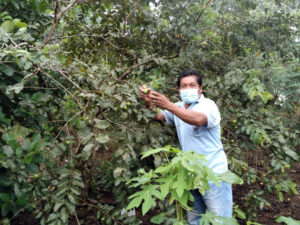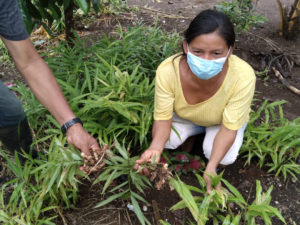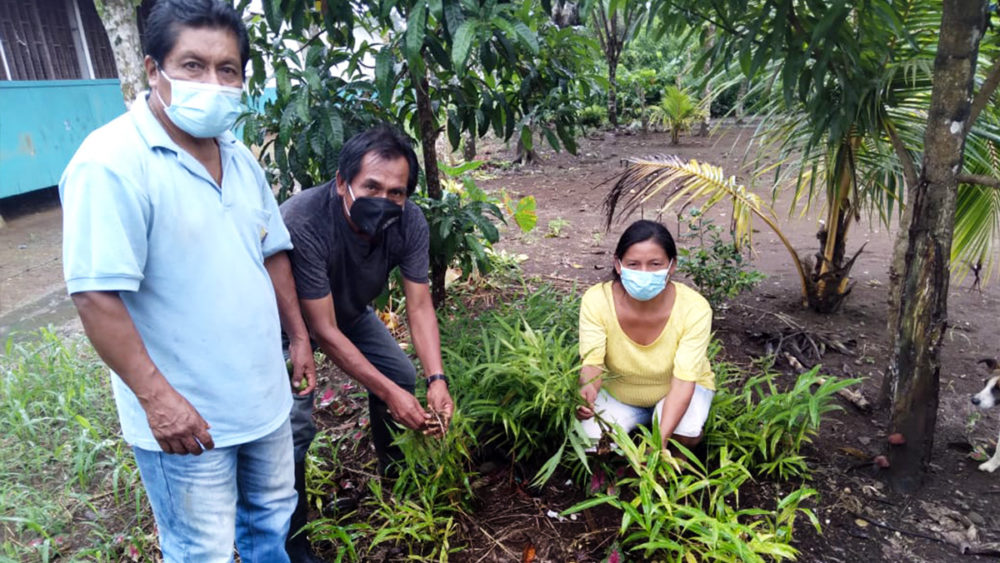One of the greatest challenges in transforming traditional production systems to sustainable deforestation-free models is to provide greater opportunities and benefits for local producers. In the Shuar Tuutinentza Community located in the Taisha canton of the Morona Santiago province, an innovative bio-entrepreneurship proposal aims to achieve this goal.
So far, the complex living conditions of the more than 2,000 community members living in this area have made it necessary for them to expand the agricultural frontier into territories that were traditionally used for conservation and hunting for self-consumption.
“One of the main problems of my family and my community is the lack of opportunities and economic incentives to help us get ahead and earn a secure income,” said the representative of the Association of Organic Producers of the Tuutinentza community, Antonio Juwa.
In the context of this situation, PROAmazonía, a program led by the Ministries of Agriculture and Livestock, and Environment and Water with the support of the United Nations Development Program, in April 2019 launched a financing mechanism for projects to stimulate the bio-entrepreneurship of non-timber forest products. In addition to this partial economic incentive, these projects, including that of the Tuutinentza Community, include technical cooperation from partner organizations, PROAmazonía and the participating communities themselves to develop sustainable livelihoods based on the use of non-timber forest products as an economic alternative to avoid deforestation.
After successfully participating in a bidding contest, the community bio-entrepreneurship received funding of USD 40,000. At the moment, with the coordination of the Pachamama Foundation, approximately 40% of the programmed activities have been completed.
In Tuutinentza, based on a market analysis and the previous work of the Pachamama Foundation with cosmetics, it was decided to venture into the manufacture of soaps with ingredients native to the Amazon forest. “The quality of natural ingredients that the community has, the situation of COVID-19 that promotes greater use of soap and the fact that its elaboration is not complicated made us present this option to the community that was approved by the community,” explained Diana Mora, Consultant of the Forest Economies Program of the Pachamama Foundation.
The soaps will be made with the products collected in the Aja Shuar [1] such as Amazonian cinnamon or ishpingo, dragon’s blood, ginger and sekemur (a plant used by the Shuar in body hygiene).
Although the COVID-19 pandemic has affected the development of some sectors, Tuutinentza’s bio-entrepreneurship continues with important advances. The community has an association with 21 members (13 men and eight women), which is evidence of equal participation, a priority for PROAmazonía projects that promote the mainstreaming of the gender approach.
In addition, as part of the development of the bio-entrepreneurship, an agreement was signed with the Universidad Técnica Particular de Loja (UTPL), whose team is in charge of carrying out the laboratory tests and the subsequent generation of two prototypes of soaps made with Tuutinentza’s raw material. In this way, the group of community artisans will be able to start the manufacturing process with cosmetic grade formulations.
As a complement to the bio-entrepreneurship of soaps with natural ingredients, the technical team of the Pachamama Foundation proposed the organic cultivation of vanilla as another sustainable production opportunity with commercial potential. In turn, the establishment of commercial networks and community support have also been a priority of the project.
An agreement was signed between the Shuar Tuutinentza Community and the Kichwa Wiñak Association, which will provide training, technical assistance and access to productive microcredits in order to strengthen the production and marketing chains of both parties. The agreement represents a new potential market for the Tuutinentza Community, which hopes to take advantage of it to increase the income of its new artisans.
To consolidate this bio-entrepreneurship, PROAmazonía will hold a series of workshops on business tools and innovation and promotional activities to facilitate the successful insertion of the soaps in the market.
“Developing our own entrepreneurship gives us the opportunity to move our families, our community and more communities in the parish who wish to join the project forward. The impact of this work will be positive on a social, economic and environmental level for all members of the community,” stresses Juwa, who is optimistic about the initial results of the bio-entrepreneurship.
The innovative project seeks to generate added value to the community’s native biodiversity products by recognizing and revaluing their ancestral knowledge related to the management of aja. Above all, importance is given to the participation of women in this activity, which is fundamental for the production of food that guarantees the food sovereignty of the community and will also contribute to its economy with the commercialization of the products produced.
With the successful development of the artisanal soap bio-entrepreneurship and the revitalization of the Aja Shuar, 3,000 hectares of community forest are expected to be protected by mitigating the expansion of activities such as livestock, monoculture and indiscriminate logging. The Tuutinentza community understands that non-timber forest products depend on the conditions of the forest and they recognize the importance of using them sustainably.
Important aspects
- PROAmazonía will invest USD 748,976 for the non-reimbursable financing of 17 projects to promote bio-entrepreneurships until July 2022.
- With this funding, 14 indigenous communities will improve their income opportunities derived from forests as a strategy to promote forest conservation.
- The priority target group of this financing mechanism are indigenous peoples and nationalities, youth and women.

Photograph: Pachamama Foundation
Description: Guava cultivation in the chakra of Tuutinentza’s soap producer partner.

Photograph: Pachamama Foundation
Description: Bio-entrepreneurs receive training on planting and care of native plants in the Tuutinentza community.
[1] Aja Shuar is a Shuar woman’s own agricultural production system that allows family sustenance, complementary to man’s activities; hunting, fishing and gathering. The aja contains approximately 50 plant species and serves as a seed bank for the conservation of the species over time. (UTPL 2012)
Authors:
Fernando Salazar, Assistant in Monitoring of Bio-entrepreneurship Subprojects.
Martín Pastor, Technician in Social Communication, Writing and Editing
 Español
Español English
English

Comments are closed.